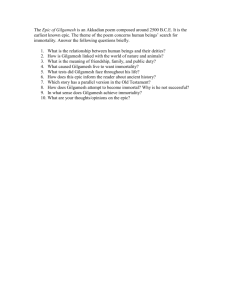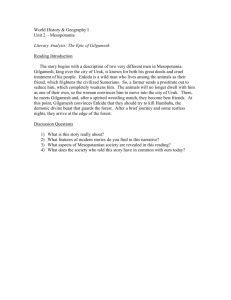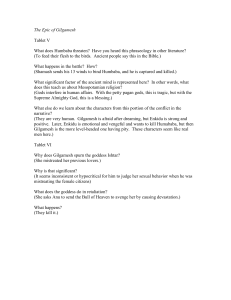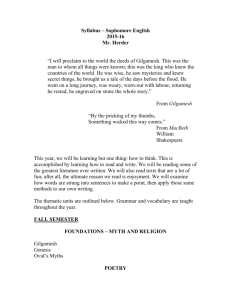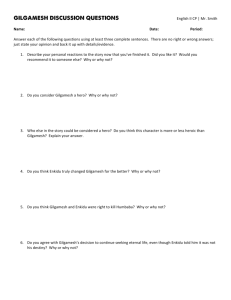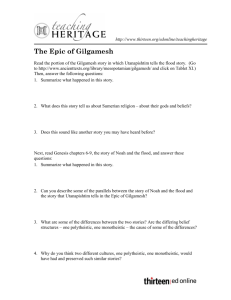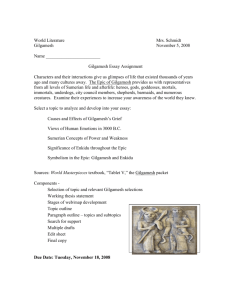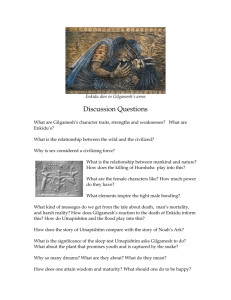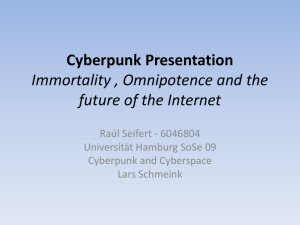Humanity's Quest for Immortality
advertisement
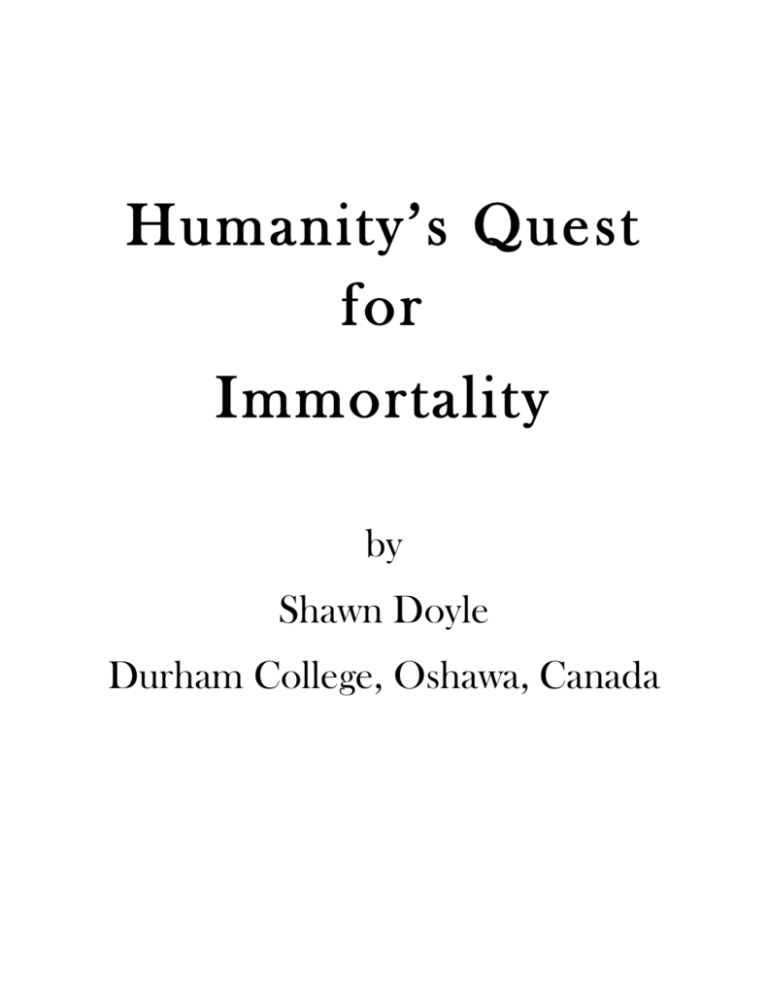
Humanity’s Quest for Immortality by Shawn Doyle Durham College, Oshawa, Canada “When the gods created mankind, Death for mankind they set aside, Life in their own hands retaining” -­‐Siduri to Gilgamesh, Tablet 10 from “The Epic of Gilgamesh.”1 Gilgamesh is one of the earliest recorded kings in human history. Over 4000 years ago he ruled over Uruk, an ancient Babylonian kingdom in present-­‐day Iraq. The fact that we know any details about him at all speaks to his importance and monumental stature. The Epic of Gilgamesh is one of the oldest literary works because Gilgamesh wielded power the world had never seen. His power was so profound that when scholars were inscribing the first recorded words on clay tablets, the story had to be about Gilgamesh. More importantly, the story had to be preserved. It was the first myth so important that it could not possibly be lost for future generations. That’s why the 7th century Assyrian king Ashurbanipal translated the original Sumerian text into Akkadian and used 12 stone tablets to save the epic poem. The Epic of Gilgamesh begins with Gilgamesh traveling with his friend Enkidu. While journeying, Enkidu falls ill as a result of angering the gods. Gilgamesh is suddenly confronted with the reality of death and becomes terrified. “When I die, shall I not be like Enkidu?”2 Despite having all the power in the world, Gilgamesh is still as vulnerable to death as any other being. Thus, he seeks out immortality in the form of an underwater plant. The fact that he ends up losing the plant and the promise of eternal life isn’t the important detail. What’s fascinating is that an incredibly powerful, early king chose to search for immortality. When given the choice of anything in the world, our earliest humans wanted to live forever. It’s a desire that has persisted throughout human history. 1 2 Eliade, Mircea. <http://www.mircea-­‐eliade.com/from-­‐primitives-­‐to-­‐zen/159.html> Ibid It’s important to note that nature and evolution have already beaten humans when it comes to unlocking the secrets of immortality. The Turritopsis nutricula is a species of jellyfish with the power to control its life cycle. At any point in the adult stage, the jellyfish can revert back to its infant state through a process called transdifferentiation. It’s similar to a salamander regenerating a limb, but the entire body can be regenerated an unlimited number of times. Because they’re immune to aging, the population of Turritopsis nutricula are spiking around the world. Unfortunately at this point, no single jellyfish has been studied for an extended amount of time, so it’s impossible to say how old any of them could be. But they are biologically immortal, technically capable of living an infinite number of years. Of course they’re still susceptible to disease and predators, but the fact that the population is rapidly increasing indicates that this ability is a recently gained evolutionary trait. Obviously it’s enticing to think of the applications of this to human life. In 2009, Dr. Hongbao Ma published a paper on the species, concluding “Upto now, there is little academic report in the Turritopsis nutricula studies. To study the reason of the biological immortality of Turritopsis nutricula possibly supplies the way finding the biological immortality for human.”3 It’s concurrently thrilling and terrifying to think we may be living in the generation that finally ends humanity’s 4000-­‐year odyssey for immortality. That’s exactly what a number of scientists and philosophers believe will happen. Ray Kurzweil has been among the most vocal. He’s a noted futurist who has correctly predicted future technological advances in the past. He believes nanotechnologies will be capable of replacing vital organs in the near future. “I and many other scientists now believe that in around 20 years we will have the means to reprogramme our bodies’ stone-­‐age software so we can halt, then reverse, aging. Then nanotechnology will let us live forever.”4 With all due respect to Mr. Kurzweil, his prediction is essentially just speculation. The reaction of society to nanotechnology and robotic 3 Hongbao Ma. <http://www.sciencepub.net/nature/ns0802/03_1279_hongbao_turritopsis_ns0802_15_20.pdf> Willis. <http://www.telegraph.co.uk/science/science-­‐news/6217676/Immortality-­‐only-­‐20-­‐years-­‐away-­‐says-­‐ scientist.html> 4 integration is difficult to predict. There’s another modern voice on immortality that I feel will have a much larger impact on our world. Dr. Aubrey de Grey is the brilliant researcher behind Rejuvenation Research, a group advancing rejuvenation biotechnologies. Dr. de Grey has developed a plan titled SENS (Strategies for Engineered Negligible Senescence). Senescence is another way of referring to biological aging. The research focuses on the repair of pathogenic, molecular and cellular damage. By controlling the damage these entities undergo over time, the aging process can essentially be reversed. “A key aspect of SENS is its potential to extend healthy lifespan without limit, even with repair processes which remain imperfect, as the repair only needs to approach perfection rapidly enough to keep the overall level of damage below pathogenic levels.”5 SENS aims to constantly restore youthful cellular and molecular structure to older organs and tissues. Dr. de Grey views 25 years as a realistic timeframe for the full implementation of the SENS program. If the program is fully successful, any person using it would be biological immortal. Death by a serious physical trauma would still be possible, so this would not constitute the god-­‐like immortality that Gilgamesh craved. However this is the most advanced research in human history concerning the aging process and offers a look at what our future could entail. It’s remarkable to consider that a 4000 year old journey might finally be coming to an end. Earlier on I remarked that these facts both thrilled and terrified me. Of course one has to feel fortunate to live in a time that humanity has been dreaming of for millennia. But this technology is not going to benefit everyone. Gilgamesh searched out immortality for himself, not for the people of his kingdom. When this technology is made available, it’s likely that society’s elite will be the ones benefitting. Instead of enriching humanity, rejuvenation technologies could simply broaden the gap between the haves and the have-­‐nots. Death is the great equalizer amongst all mankind. Perhaps it should stay that way. 5 SENS Foundation. <http://www.sens.org/users/aubrey-­‐de-­‐grey> Works Cited Eliade, Mircea. “Gilgamesh In Search of Immortality.” From Primitives to Zen. Nebulous Cargo Productions. 1996. Web. 14 Feb 2011. Hongbao Ma, Yan Yang. “Turritopsis nutricula.” Nature and Science. Marsland Press. 21 Nov 2009. Web. 14 Feb 2011. Hooker, Richard. “Gilgamesh Summary” Washington State University. 6 June 1999. Web. 14 Feb 2011. <http://www.wsu.edu/~dee/MESO/GILG.HTM> Nelson, Bryan. “The world’s only immortal animal.” Mother Nature Network. Yahoo! Green. 16 Mar 2010. Web. 14 Feb 2011. <http://green.yahoo.com/blog/guest_bloggers/26/the-­‐world-­‐s-­‐only-­‐ immortal-­‐animal.html> SENS Foundation. SENS Foundation, 2010. Web. 14 Feb 2011. <http://www.sens.org/> Willis, Jessica. “Immortality only 20 years away says scientist.” The Telegraph. Telegraph Media Group Limited. 22 Sep 2009. Web. 14 Feb 2011.
